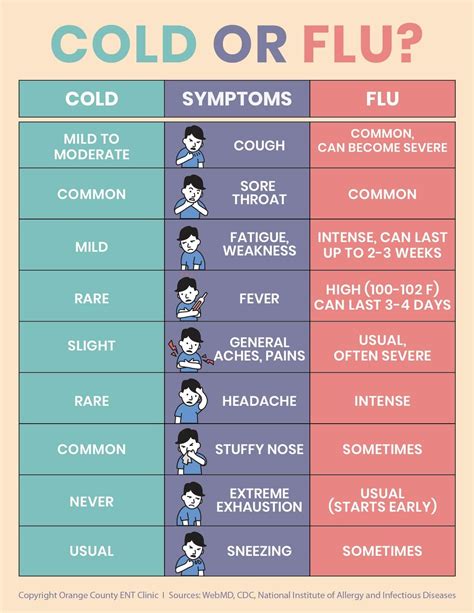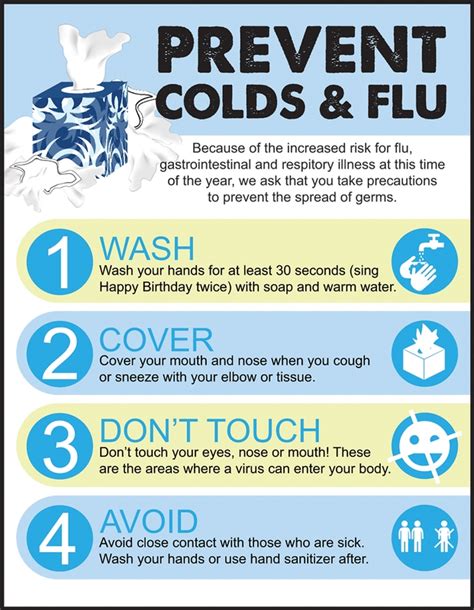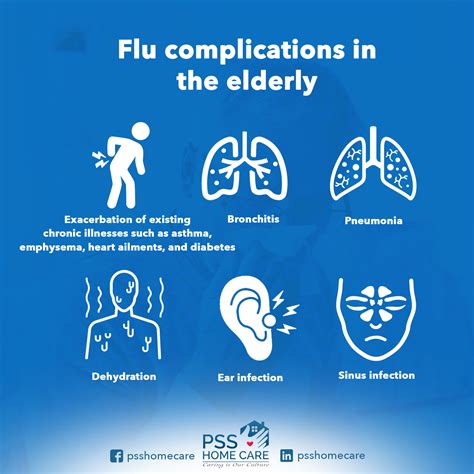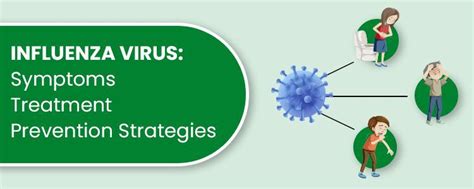Intro
Identify 7 flu virus symptoms, including fever, cough, and fatigue. Learn about influenza symptoms, treatment, and prevention to reduce risk of flu complications and stay healthy during flu season with natural remedies and medications.
The flu, also known as influenza, is a highly contagious respiratory illness caused by the influenza virus. It can affect anyone, regardless of age or health status, and can range from mild to severe. With the flu season typically occurring during the winter months, it's essential to be aware of the symptoms to seek medical attention promptly if needed. The flu virus symptoms can vary from person to person, but there are common signs to look out for. Understanding these symptoms can help you take the necessary precautions to prevent the spread of the virus and seek medical attention if your symptoms worsen.
The flu virus is highly contagious and can spread through the air when an infected person talks, coughs, or sneezes. It can also spread by touching surfaces or objects that have the virus on them and then touching your mouth, nose, or eyes. The flu can have a significant impact on daily life, causing missed work or school days, and in severe cases, it can lead to complications such as pneumonia, bronchitis, or sinus and ear infections. Being aware of the symptoms and taking preventive measures can help reduce the risk of getting infected.
In addition to understanding the symptoms, it's crucial to know how the flu virus works and how it affects the body. The flu virus attacks the respiratory system, causing inflammation and congestion in the lungs, nose, and throat. This can lead to a range of symptoms, from mild to severe. By recognizing the symptoms early on, you can take steps to manage them and prevent the virus from spreading to others. In this article, we will delve into the common symptoms of the flu virus, discuss how it works, and provide tips on prevention and treatment.
Understanding the Flu Virus

How the Flu Virus Spreads
The flu virus spreads through respiratory droplets, contact with contaminated surfaces, and close contact with an infected person. When an infected person talks, coughs, or sneezes, they release droplets that contain the virus into the air. These droplets can be inhaled by others, causing infection. The virus can also survive on surfaces for several hours, allowing it to spread through touch. By understanding how the flu virus spreads, you can take steps to prevent infection, such as frequent handwashing, avoiding close contact with infected individuals, and wearing a mask in crowded areas.Common Flu Virus Symptoms

Managing Flu Virus Symptoms
Managing flu virus symptoms can help alleviate discomfort and prevent complications. Here are some tips: * Stay hydrated by drinking plenty of fluids, such as water, soup, or electrolyte-rich beverages * Rest and avoid strenuous activities * Use over-the-counter medications, such as pain relievers, decongestants, and antihistamines, to manage symptoms * Practice good hygiene, such as frequent handwashing and avoiding close contact with others * Consider taking antiviral medications, such as oseltamivir or zanamivir, if prescribed by your doctorPrevention and Treatment

When to Seek Medical Attention
If you experience any of the following symptoms, seek medical attention promptly: * Difficulty breathing or shortness of breath * Chest pain or pressure * Severe headache or confusion * Fever above 103°F (39.4°C) * Vomiting or diarrhea that lasts more than 2 days * Severe fatigue or weakness * Coughing up blood or yellow or green mucusComplications of the Flu Virus

High-Risk Groups
Certain groups are at higher risk of developing complications from the flu virus, including: * Older adults (65 years and older) * Young children (under 5 years) * People with underlying health conditions, such as heart disease, diabetes, or lung disease * Pregnant women * People with weakened immune systems, such as those with HIV/AIDS or taking immunosuppressive medicationsConclusion and Next Steps

What are the common symptoms of the flu virus?
+The common symptoms of the flu virus include fever, cough, sore throat, runny or stuffy nose, headache, fatigue, and muscle or body aches.
How can I prevent the flu virus?
+You can prevent the flu virus by getting vaccinated annually, practicing good hygiene, avoiding close contact with others, and staying healthy by getting enough sleep, exercising regularly, and eating a balanced diet.
When should I seek medical attention for the flu virus?
+You should seek medical attention promptly if you experience difficulty breathing, chest pain, severe headache, fever above 103°F (39.4°C), vomiting or diarrhea that lasts more than 2 days, or severe fatigue or weakness.
What are the complications of the flu virus?
+The flu virus can lead to complications such as pneumonia, bronchitis, sinus and ear infections, and heart problems, especially in high-risk groups such as older adults, young children, and people with underlying health conditions.
How can I manage flu virus symptoms?
+You can manage flu virus symptoms by staying hydrated, resting, using over-the-counter medications, practicing good hygiene, and considering antiviral medications if prescribed by your doctor.
